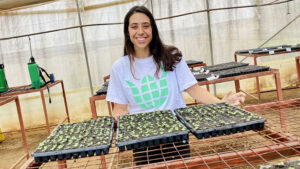We are living through a time that will be remembered for many years to come as one of uncertainty and upheaval. So how will all this change affect the development of new varieties and the distribution of seed throughout the world?
One thing’s for certain: the importance of food security has never been more emphasized.
The challenge that we have is to distribute this seed to those that need it the most. We are now experiencing something that is an everyday occurrence in Third World countries: shelves are empty of everyday items that we take for granted. In the Western world, people have realized the importance of food and have even reverted back to growing their own food, which has put a great demand on the seed sector.
But how will this affect the developing world? Roughly 49% of the population in developing countries (3 billion people) live in rural areas and grow their own food. The greatest threat to their food security would be due to the distribution of this food into cities and health systems. With limited ability to test and manage COVID-19, the spread of the disease will mean large scale lockdowns of high population areas and food supplies will quickly diminish. This could lead to civil unrest, magnifying the effect of the virus as people ignore social distancing restrictions.
Help from the Western world will be limited. People in these countries will be suffering from high unemployment, which means there will be less money donated to charities or coming from government aid programs. Volunteers will not be able to travel between countries to help with aid projects, and giving instructions to projects in developing countries will be difficult due to unstable internet connections. There will be an increasing reliance of local governments having “in country” projects using local expertise to run them. Even within a country there may be travel restrictions to prevent the spread of the virus, so internal country project will not be easy.
It is inevitable that the price of seed will increase as supply will not be able to keep up with demand. So, what is the solution to this dilemma? The answer comes with the entrepreneurship of locals.
With the right skills, small seed businesses will appear supplying the growing market. As demand and supply begin to equalize there may be the realization that varieties being grown in a region are not suited to the climate. In return, this may lead to the development of new varieties. Accessing new varieties from overseas is getting more difficult as quarantine requirements are becoming more costly or companies are wanting to sell their varieties with intellectual property in a country where there is poor respect for these rules.
Breeding programs for large seed companies are very much related to the size of the local market. If there is a certain economic threshold that is met for the volume of seed that is sold in a region, that encourages the development of breeding programs for that specific region. Maybe there might be a surge in the number of “micro-seed companies” that are started by smallholder farmers that see the opportunity to produce seed to supply the increasing demand. There will be a greater need for research to prove that the new varieties in a region give increase yields or benefits to farmers. A quick transition from the informal to the formal seed sector will be needed to create a source of income through levies to allow this research to be carried out. Without an understanding of the value of this research and the added benefit of improved varieties, we will continue to see an informal seed sector and the genetic gains that will be required to keep up with the negative effects of climate change or an increasing population growth will not be achieved and a cycle of food insecurity will continue.
Inspired after reading “The Coming Famine,” Australian plant breeder Anthony Leddin set out to make a difference. Plant Breeders Without Borders encourages plant breeders and students to volunteer their time for international breeding projects.













